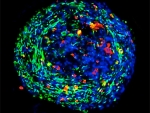Displaying items by tag: precision medicine
Precision medicine approach may identify those at high genetic risk of hypertension, heart failure, stroke and heart attacks and use precision medicine to help prevent fatal cardiovascular diseases.
Tagged under
New $78 million Altec/Styslinger Genomic Medicine and Data Sciences Building will accelerate advancements in precision medicine, informatics and data sciences — areas that represent the future of modern health care.
Tagged under
Genome sequencing leads to new understanding of genetic risk factors that might play a role in the risk of dementia.
Tagged under
UAB, in conjunction with Harvard, is the coordinating center for the national Undiagnosed Diseases Network, funded by the National Institutes of Health
Precision medicine found the right drug for the right patient, helping one UAB prostate cancer patient make a remarkable recovery.
Tagged under
The five-year funding award will support the Southern All of Us Network, part of the All of Us Research Program, a nationwide research program to transform how research is conducted to advance individualized prevention, treatment and care for people of all backgrounds.
Tagged under
mediKanren, an "analytic engine" designed by UAB researchers, can sift 97 million assertions in seconds to find new treatments for patients and research avenues for scientists.
The All of Us Research Program, an effort by the NIH to build a national database for medical research, launches on May 6 at UAB and six other sites nation-wide.
Cancer is a disease with a thousand faces. Oncologists like Eddy Yang have to recognize which one they’re seeing with each new patient. Yang leads a pioneering new kind of cancer program at UAB: the Molecular Tumor Board.
Tagged under
Four multidisciplinary studies will focus on genetics and associated mechanisms of hyperuricemia gout, an inflammatory arthritis.
Tagged under
Matt Might, Ph.D., a strategic leader in the White House Precision Medicine Initiative, has been named the inaugural director of the Hugh Kaul Personalized Medicine Institute at UAB.
Tagged under
UAB’s annual Reynolds-Finley Lecture will feature discussion of the collaboration between UAB and HudsonAlpha in precision medicine.
Tagged under
In another example of precision medicine, UAB researchers have used IPF patients own lung tissue to create models to determine the most effective medication for that patient.
Tagged under












